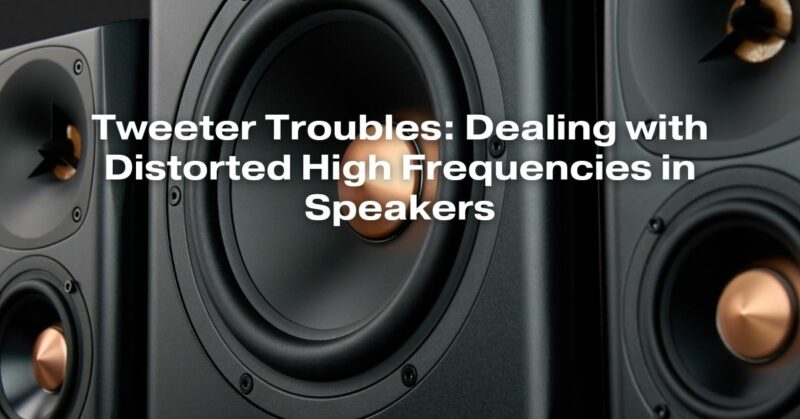Tweeters are the small speakers in your stereo system that reproduce high frequencies, such as cymbals, hi-hats, and vocals. When tweeters are working properly, they can produce clear and crisp sound. However, tweeters can also distort, resulting in a harsh and unpleasant listening experience.
There are a few common causes of tweeter distortion. One cause is clipping. Clipping occurs when the amplifier in your stereo system is overloaded and unable to produce the full range of the audio signal. This can happen if you play your music at too high of a volume.
Another cause of tweeter distortion is damage. If your tweeters are physically damaged or have worn out, they may produce distorted sound. This can happen if you drop your speakers, expose them to extreme temperatures, or play them at too high of a volume over time.
If you’re experiencing distorted high frequencies in your speakers, there are a few things you can do to try to fix the problem. First, check to make sure that your amplifier is not clipping. You can do this by lowering the volume until the distortion stops. If the distortion persists even at low volumes, then the problem is likely with your tweeters themselves.
If you suspect that your tweeters are damaged, you can try to repair them yourself or take them to a professional. If the tweeters are beyond repair, you will need to replace them.
Here are some additional tips for dealing with distorted high frequencies in speakers:
- Use a high-quality audio source. If you’re playing low-quality MP3s, your speakers will likely sound distorted. Try playing lossless audio files or streaming music from a high-quality service.
- Use a high-quality amplifier. A cheap amplifier is more likely to clip and distort the audio signal. If you have a high-end stereo system, make sure you’re using an amplifier that can keep up.
- Position your speakers correctly. If your speakers are too close to a wall or other object, they can reflect sound waves and cause distortion. Try positioning your speakers so that they have plenty of space around them.
- Upgrade your speakers. If you have old or cheap speakers, they may not be able to reproduce high frequencies accurately. Upgrading to a pair of high-quality speakers can make a big difference in sound quality.
If you’ve tried all of the above and you’re still experiencing distorted high frequencies, it’s possible that there is a problem with your crossover circuit. The crossover circuit is responsible for directing the different frequency ranges to the appropriate drivers in your speakers. If the crossover circuit is not working properly, it can cause distortion.
If you suspect that there is a problem with your crossover circuit, you should take your speakers to a professional for repair.
Conclusion
Distorted high frequencies in speakers can be caused by a variety of factors, including clipping, damage, and crossover circuit problems. By following the tips above, you can try to identify and fix the cause of the distortion. If you’re unable to fix the problem yourself, you should take your speakers to a professional for repair.
Here are some additional things to keep in mind:
- If you’re playing your music at too high of a volume, you’re more likely to experience tweeter distortion. Be sure to keep the volume at a reasonable level, especially if you’re playing music with a lot of high frequencies.
- If you have pets or children, be careful not to let them damage your speakers. Pets can scratch or chew on speaker cones, and children can accidentally drop or knock over speakers.
- If you’re not sure how to fix a problem with your speakers, it’s always best to consult a professional.


